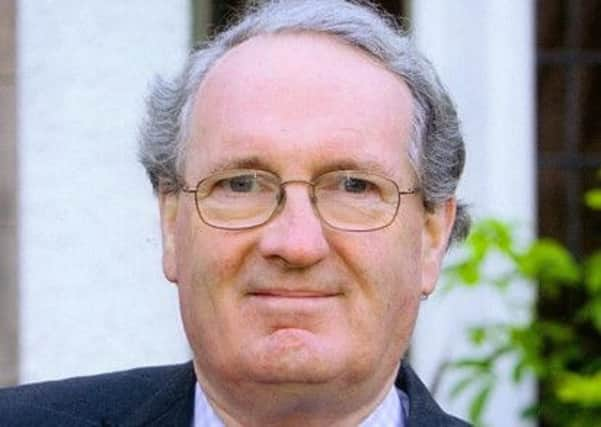Donald MacDonald’s 30-year SCO reign ends


Of course, I’ve no idea what MacDonald is like in his day-to-day business dealings as a financier, entrepreneur and co-founder of MacDonald Orr, through which he and his business partner, Sandy Orr, have established numerous companies, including the City Inn hotel chain.
I only know, despite his disarming modesty, that he’s been extremely successful, that he is a passionate lover of the arts, with a fine collection of Scottish paintings, and that through his benevolent voluntary chairmanship of the Scottish Chamber Orchestra, and more recently the East Neuk Festival, which he founded, he and his wife Louise have not only invested considerable amounts of their own money – including the commissioning of major works for the SCO and Edinburgh Festival – but have also encouraged others to do so in a way that has benefitted many organisations.
Advertisement
Hide AdThis month, MacDonald steps down as SCO chairman after an astonishing 30 years. Did he ever intend staying so long? “With modern corporate governance rules, that kind of tenure wouldn’t happen today. Normally you’d expect to serve eight or nine years before being maxed out,” says MacDonald.
“I’ve been fortunate to have had only two chief executives working with me over that time,” he continues, describing Ian Ritchie’s leadership through the late 1980s and early 1990s as “pioneering in the areas of new music and educational development” (a time that witnessed the commissioning of the ten ground breaking Strathclyde Concertos from Peter Maxwell Davies); and current boss, Roy McEwan, “who, over two decades, has been very successful at developing recordings, who has impeccable musical taste, and who is a very good manager of people”.
Ask him what the biggest highlight was for him as chairman, and MacDonald lets out a long sigh. “That’s too difficult; there are too many,” he says. But he cherishes the memories of working with the late conductor emeritus Sir Charles Mackerras, in particular the seven Mozart operas he directed in concert performance at successive Edinburgh Festivals, and Beethoven’s Fidelio at the Barbican in London. “That was terrifically exciting,” MacDonald recalls.
As he expands, the shrewd business mind begins to emerge. “The secret is not to get bad surprises, but still to take measured leaps in the dark. The Mackerras thing was a brilliant investment decision, through which we got all these operas in the summer months when the players didn’t traditionally have work, as well as the recordings of Mozart symphonies. You’ve got to have an eye for that sort of thing.
“It’s amazing what arts companies achieve, especially when you look at the balance sheet and see there’s no risk capital to talk of. I think the SCO has been managed as tightly as any business I’ve been involved with.”
Despite the many triumphs, from tours of Japan and India to another MacDonald favourite, the complete Mozart piano concertos with Christian Zacharias, one goal has constantly defeated him, which seems relevant again in the wake of the launch of Desire Lines, an initiative by the Edinburgh arts community to address weaknesses in arts provision in the capital.
Advertisement
Hide Ad“It’s this dilemma that we desperately need a venue in Edinburgh similar to the City Halls in Glasgow – a medium scale hall with 1,000 to 1,200 seats,” he says. “It’s a necessary part of the ‘hardware’ – not just for us – that the city doesn’t have. It’s fascinating to think that in the lifetime of the Edinburgh Festival there’s not been one new performing arts building constructed apart from the Traverse.
“There was a report several years ago, Thundering Hooves, which looked at Edinburgh in relation to arts infrastructure in other UK cities, and the conclusion was that Edinburgh had to keep looking over its shoulders, and that a vital part of that was about having the necessary hardware, which is just as important as the software.”
Advertisement
Hide AdAs a businessman he understands the issues. “These aren’t like commercial projects, which are relatively easy by comparison, where you put up an office block and they’re able to rent it at X, therefore values rise, so you’re able to raise the money,” he explains.
“But it’s frustrating nonetheless, and it does take a long time. People in Birmingham tell me the city first started talking about its new symphony hall with Sir Adrian Boult in 1926. I’m optimistic that we’re closer to something than that, though it has already been a long journey, and the middle of Edinburgh – where it really needs to be – does not have many potential sites. We’re just going to have to keep driving at it.”
“I’ll still be around to help,” promises MacDonald, who has been appointed life president of the SCO. Fellow businessman Colin Buchan takes over as chairman.
But equally, he’ll be giving much of his time to what he calls the “complete self-indulgence” that is the East Neuk Festival. MacDonald engineered its creation, along with founding director Svend Brown, ten years ago as a means of bringing classical music to a part of the world where he owns a second home, and where he felt there was a market for summer music.
A decade on, it is growing like topsy, and the 2015 festival, which will include a new “academy” for young chamber musicians, is set to be the most ambitious yet. Like most successful businessmen, MacDonald can still spot a winner, and run with it.